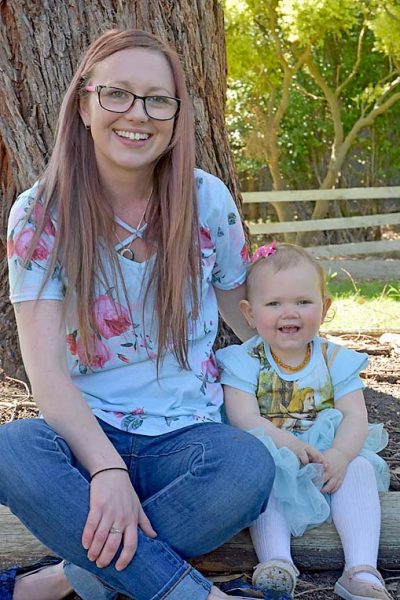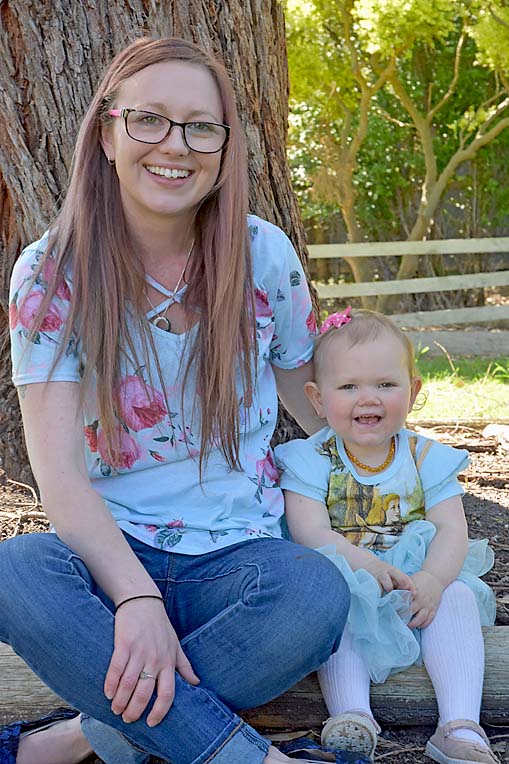
Picture: BROOKE LITTLEWOOD
KATIE Gurney has battled the demons of mental health.
The scars from self-harm that mark her body remind her of not only the pain she has endured, but also the fight she has won.
However, while these scars serve as a reminder of her journey, they do not tell her whole story.
Katie, 29, suffered with depression, anxiety and borderline personality disorder (BPD) – a mental disorder characterised by unstable moods, behaviours and relationships.
She said it was not until her teenage years that she started to realise she “was not quite like” the rest of her peers.
“I acted a lot older than my actual age and started dabbling in self-harm practices,” she said.
“From the ages of 16 to about 23, I was at my worst and things started to get out of control.
“I understand now why those feelings emerged, at the time though I had no idea.”
As Katie started growing older, her moods became more erratic and often she did not know how she felt, why she felt the way she did or how to deal with it.
She lost many friends, drank alcohol excessively and self-harmed.
For the most part Katie believed her behaviour was normal and pretended everything was fine, when in reality it was far from it.
“I disassociated from most of what I did and I do not have a whole lot of memories from that time,” she said.
“A lot of it just felt like a blur, having no real sense of who I was or what I was doing.”
Katie added that because BPD was misunderstood and not commonly known, it was hard to come to terms with her illness.
“There are many factors to being diagnosed with BPD,” she said.
“No two people with this disorder are the same, though many share similar traits.”
Anytime Katie would experience an emotion, or she would “hate” herself she would turn to self harm, which gave her a sense of control.
She said at that point it felt like it was the only thing she could control because she could not make sense of her emotions and she had nowhere else to take out her confusion.
As she watched her daughter’s moods and behaviour spiral out of control, Katie’s mother, Deb, sought professional help.
However, Katie could not connect with her counsellor and a particular experience put her off seeing anyone for a long time.
She did not start to recognise changes in her mental stage until she was around 20 years old when she met with a mental health nurse and began narrative therapy.
“As I started narrative therapy and began to understand what was going on, it was like the fog was clearing,” she said.
“Things made more sense.
“I was connected to myself again and stopped dissociating, stopped self harming and stopped making terrible decisions whilst drinking.
“I worked really hard and very intensely to ‘get better’ and the hard work paid off.
“I developed a lovely relationship with my mental health nurse and worked very hard with her to sort out my emotions and behaviour.
“I refused medication because I knew what was happening needed to be fixed and healed and I wanted to do that on my own with a clear head.
“I’m not against medication at all, but I was frightened that if I took it and temporarily felt better that I would not battle things as hard as I did and I’d still be left with unresolved issues.”
Katie added that while many people do not like being labelled, her diagnosis with BPD came as a “blessing”.
“It meant I was not crazy, something was actually wrong and after some research I realised it was something I could heal from,” she said.
“I knew how often I was self harming was not normal at that point and my suicidal thoughts were getting too scary and real.
“I did not want to die, but I did not want to keep feeling the pain either … I made it my mission to get help.”
She found the stigma and lack of understanding surrounding mental health to be the hardest part of her battles, as well as some people not caring to understand at all.
“I battled my own demons and it showed on my skin,” she said.
“People would often feel as though they could comment or make jokes about it … or they would tell me to stop without trying to understand why it was happening, including strangers and also health professionals.
“This is really dangerous in itself for self harmers, as they will hide the fact and many people will not know until it’s too late.”
Meanwhile, Katie said the scariest part of her battle was sometimes feeling she did not have control.
She recalls one day her mother had to take her to hospital because she had a clear plan in her head of suicide.
Luckily enough, she was brave enough to reach out.
Nowadays Katie is a single mum and while she has her bad days every now and then, it is her daughter Zoe who gets her through.
“I would never do anything to jeopardise my life with her, she keeps me going,” she said.
“So I will fight until my last breath to ensure she lives the most normal life possible.
“I still have anxiety and maybe always will, social anxiety is major for me, but most people cannot even tell because I deal with it healthily.
“I am no longer classed as having borderline personality disorder, which is a huge achievement.
“As for depression, it comes and goes, which is common for anyone who has ever been diagnosed.”
As for the future, Katie aspires to return to university and become a mental health professional.
For people who are fighting the demons of mental health or who are going through a tough time, she has a strong message:
“You do not have to do this alone.
“There are so many people out there who care.
“There is life out there to live.
“When you come out the other side of the mental health storm, there is sunshine.
“Fight for it and never give up.
“Do not be afraid to talk, to me or to someone you trust, no one deserves to go through hell on their own.”
She added everyone used to ask her how she would feel about her scars when she was over it.
“My answer to them is, I feel proud,” she said.
“I battled myself, my inner demons, fought the hardest fight of my life and won.
“I have the battle scars to prove it and I am proud of my fight, not ashamed.”








